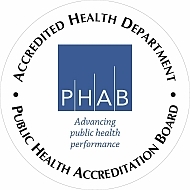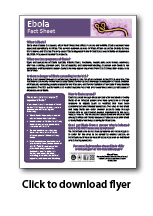Ebola virus disease is a severe, often fatal illness that affects humans and wildlife. Ebola outbreaks have appeared sporadically in Africa. The current outbreak centers in West African countries (mainly Guinea, Sierra Leone, and Liberia).
Signs and symptoms of Ebola typically include: fever, headache, muscle pain, sore throat, weakness, diarrhea, vomiting, stomach pain, lack of appetite, and abnormal bleeding. A person with Ebola is not contagious until symptoms appear. Symptoms may appear anywhere from 2 to 21 days after exposure to Ebola virus.
Ebola is not spread through casual contact, therefore, the risk of an outbreak in the U.S. is very low. The healthcare community knows how to stop Ebola’s further spread: thorough investigation of cases, isolation of ill people, contacting people exposed to the ill person, and further isolation of contacts if they develop symptoms. The U.S. public health and medical systems have had prior experience with sporadic cases of diseases such as Ebola.
Ebola is spread through direct contact with the blood or bodily fluids of an infected person who have symptoms or though exposure to objects (such as needles) that have been contaminated with infected secretions. The virus in the blood and body fluids can enter another person’s body through broken skin or unprotected mucous membranes in the eyes, nose, or mouth. The viruses that cause Ebola are often spread among families and friends because of close contact with blood or body fluids when they are caring for ill persons.
No. Individuals who do not have symptoms are not contagious. In order for the virus to be spread to another person, an individual would have to have direct contact with an individual who is having symptoms.
If you must travel to an area affected by the 2014 Ebola outbreak, you can protect yourself by doing the following:
- Wash hands frequently or use an alcohol-based hand sanitizer.
- Avoid contact with blood and body fluids of any person, particularly someone who is sick.
- Do not handle items that may have come in contact with an infected person’s blood or body fluids.
- Seek medical care immediately if you develop fever (temperature of 101.5°F/38.6°C) and any of the other following symptoms: headache, muscle pain, sore throat, weakness, diarrhea, vomiting, stomach pain, lack of appetite, and abnormal bleeding.
New York State Department of Health and the
Centers for Disease Control and Prevention (CDC)
Page updated 1-5-15
Sources: New York State Department of Health and the
Centers for Disease Control and Prevention (CDC)
|
|
|



